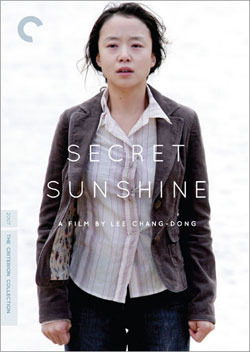In an early scene in Secret Sunshine, a pharmacist is attempting to persuade Shin-ae (Jeon Do-yeon), a widowed piano teacher who has come to the town of Miryang with her young son in tow, to join her faith. “Maybe you believe only in what you can see? You doubt what you can’t see? … But there are things you can’t see too!” This question is at the very heart of Lee Chang-dong’s film. A sprawling and rich character study of a woman’s response to the tragedies in her life, and the lengths to which she will go to heal herself, the film is anchored by Jeon Do-yeon’s mesmerizing and multifaceted performance. Jeon won the best actress award at the 2007 Cannes Film Festival, a richly deserved prize for a physically fierce and tender performance that compellingly rides the quicksilver changes that her character experiences in this Job-like tale.
Beginning with a shot of a clear blue expanse of sky, and ending with an ugly brown patch of ground, Secret Sunshine is about many things, but perhaps the most pertinent is that the beauty of humanity is its unending will to endure and find hope even in the most tragic circumstances. Lee illustrates this with his main character, Shin-ae (Jeon Do-yeon), a widowed piano teacher who arrives in the small town of Miryang (her late husband’s homeplace), with her young son Jun in tow. Miryang is a rather ordinary, colorless place, its inhabitants exhibiting the typical provincialism of such environments. Coming from Seoul, Shin-ae, attempting to start over by opening a piano academy, carelessly breaches the town’s conservative mores. She offends a clothing-store owner by recommending a new coat of paint so that her store doesn’t look so gloomy. She also speaks a little too freely about buying land in town, an act that indirectly leads to an even greater tragedy than the loss of her husband, a tragedy around which this film pivots. What that tragedy is I will not reveal for those who have not yet seen this film, since it will spoil the full effect of the extraordinary work that Lee and his actors have created. Over the course of nearly two and a half hours, Secret Sunshine puts Shin-ae, and the viewer, through an emotionally turbulent ride, one that deals with the questions that philosophers have grappled with throughout the ages: questions of God, faith, the meaning of suffering, and the existence of both the visible and invisible forces that affect our every thought and action.

After receiving a belated US theatrical release last year, Secret Sunshine now has the distinction of being the first Korean film to be part of the Criterion Collection, and is now available on DVD and Blu-ray.





